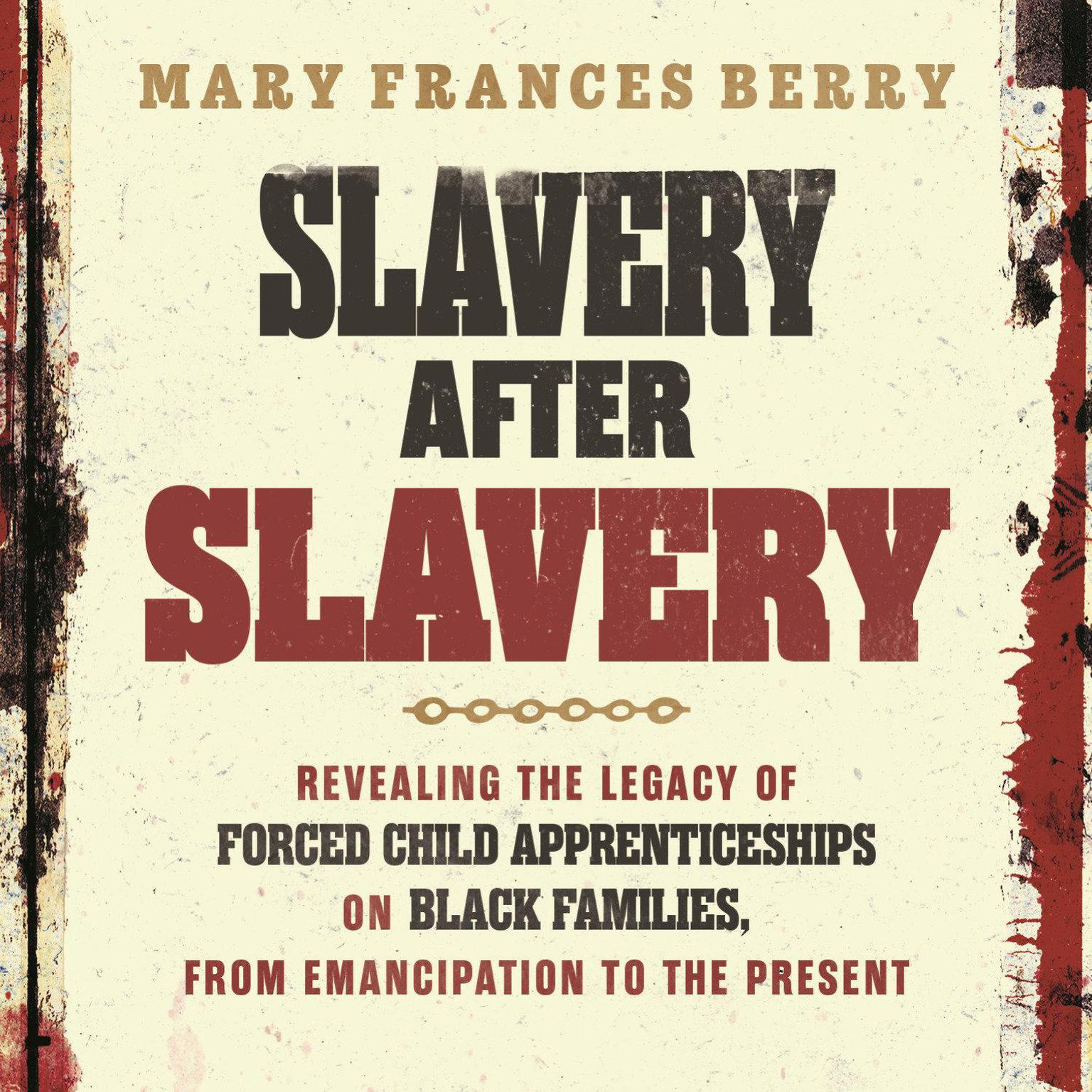 Play Audiobook Sample
Play Audiobook Sample
Slavery After Slavery: Revealing the Legacy of Forced Child Apprenticeships on Black Families, from Emancipation to the Present Audiobook
 Play Audiobook Sample
Play Audiobook Sample
Quick Stats About this Audiobook
Total Audiobook Chapters:
Longest Chapter Length:
Shortest Chapter Length:
Average Chapter Length:
Audiobooks by this Author:
Publisher Description
An acclaimed historian narrates the stories of newly emancipated children who were re-enslaved by white masters through apprenticeships and their parents fights to free them
While the Thirteenth Amendment abolished slavery, white southerners established a system of apprenticeship after the Civil War that entrapped Black children and their families, leading to undue hardships for generations to come. In Slavery After Slavery, historian Mary Frances Berry traces the stories behind individual cases from southern supreme courts to demonstrate how formerly enslaved families and their descendants were systemically injured through white supremacist practices, perpetuated by the legal system.
By filling in the family trees of formerly enslaved people to their descendants, Berry documents the intergenerational harm they experienced. The resulting damage of trafficking Black children through apprenticeship laws has been a largely overlooked source of inequality, yet these cases provide specific examples of the kind of economic and physical harm Black families have endured.
Slavery After Slavery tells individual stories, but the fates of their descendants tell our collective American story—contributing powerfully to a case for reparations and restorative justice.
Download and start listening now!
"Slavery After Slavery presents a heart-wrenching series of vignettes on white slaveholders acting to maintain ownership and control over the lives of black children through the ‘apprenticeship’ mechanism under the Black Codes. The book documents cases of fierce resistance of black parents to the theft of their children and the circumstances when they experienced success or failure in maintaining their families. At its core, Slavery After Slavery offers moving narratives of the lives destroyed and intergenerational damages wrought by the American failure to implement true Reconstruction."
— William Darity Jr., coauthor of From Here to Equality: Reparations for Black Americans in the Twenty-First Century
Quotes
-
Slavery After Slavery tells an essential part of the story of slavery that must be told. It is a brilliant, truth-telling narrative that is groundbreaking, bracing, and enormously good—a work of importance.
— Elijah Anderson, Sterling Professor, Yale University, and author of Black in White Space -
Slavery After Slavery tells an essential part of the story of slavery that must be told. It is a brilliant, truth-telling narrative that is groundbreaking, bracing, and enormously good—a work of importance.
— Elijah Anderson, Sterling Professor, Yale University, and author of Black in White Space -
“Basing her work on ten compelling court cases, Mary Frances Berry brings to life a horrific chapter of post–Civil War history that has been woefully overlooked: the virtual re-enslavement of Black children as forced laborers to enrich white adults through court-ordered apprenticeships. Slavery After Slavery is essential reading to understand—and contest—the racist structures that survived Emancipation and continue to deny Black people equal status and family autonomy in America today.
— Dorothy Roberts, author of Killing the Black Body, Shattered Bonds, and Torn Apart -
“Basing her work on ten compelling court cases, Mary Frances Berry brings to life a horrific chapter of post–Civil War history that has been woefully overlooked: the virtual re-enslavement of Black children as forced laborers to enrich white adults through court-ordered apprenticeships. Slavery After Slavery is essential reading to understand—and contest—the racist structures that survived Emancipation and continue to deny Black people equal status and family autonomy in America today.
— Dorothy Roberts, author of Killing the Black Body, Shattered Bonds, and Torn Apart
Slavery After Slavery Listener Reviews
Be the first to write a review about this audiobook!
About Mary Frances Berry
Mary Frances Berry is the Geraldine R. Segal Professor of American Social Thought and professor of history at the University of Pennsylvania. She is the author of ten books, including Power in Words, And Justice for All, and My Face Is Black Is True. She was a member of the US Commission on Civil Rights for more than 20 years and has received 35 honorary doctoral degrees and many awards, including the NAACP’s Roy Wilkins Award and the Rosa parks Awards of the Southern Christian Leadership Conference.





